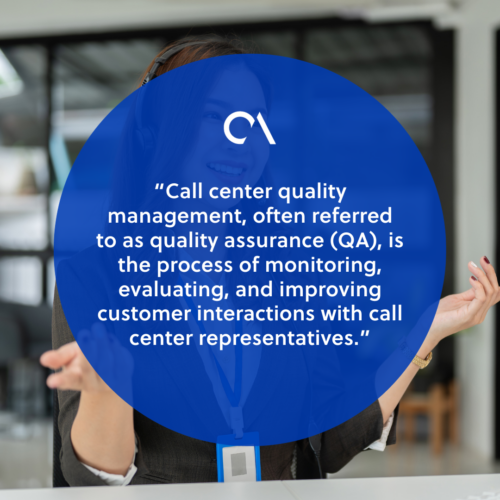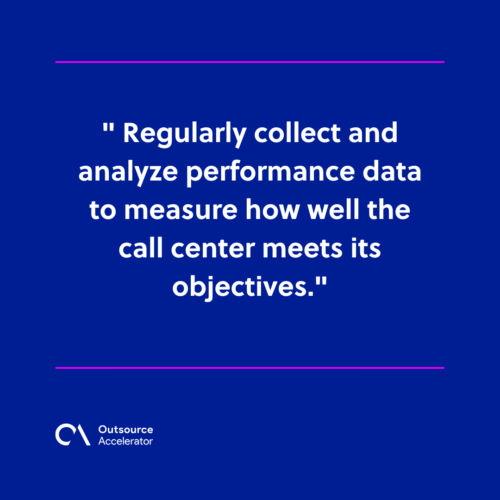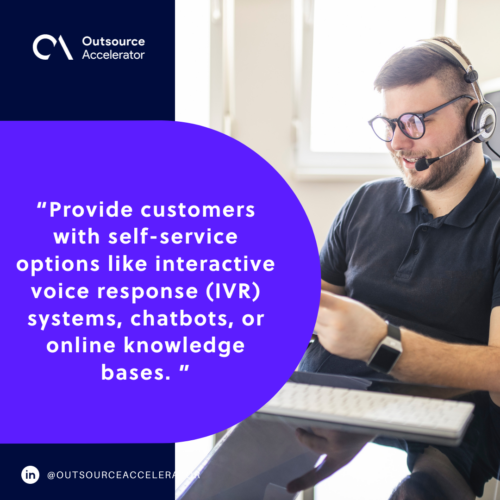The importance of call center quality management

A customer-centric business landscape means providing exceptional customer service is paramount. This is particularly true for call centers, which serve as many businesses’ primary point of contact.
Harvard Business Review reported that 80% of customer service organizations consider customer satisfaction as the primary metric to gauge and improve their quality of service.
Call center quality management is vital to ensuring customer satisfaction and loyalty.
This article will explore what call center quality management entails and discuss its importance, best practices to follow, benefits, and challenges. We’ll look at how to improve call center performance for optimal customer satisfaction.
What is call center quality management?
Call center quality management, often referred to as quality assurance (QA), is the process of monitoring, evaluating, and improving customer interactions with call center representatives.
It is a systematic approach to ensuring these interactions meet predefined standards of excellence.
Call center quality management involves:
- Setting QA standards
- Measuring performance against given standards
- Implementing strategies to enhance service quality
- Improving key performance metrics (KPIs) for consistency

Importance of call center quality management
There are plenty of reasons why a customer service-focused company should implement call center quality management:
Customer satisfaction
First and foremost, call center quality management is instrumental in enhancing customer satisfaction. Customers who receive efficient and effective support are more likely to be satisfied with the service.
Satisfied customers are not only loyal but also potential advocates for your brand. This can lead to increased business and positive word-of-mouth marketing.
Brand reputation
In our interconnected world, a single negative customer experience can quickly tarnish a brand’s reputation.
Call center quality management helps maintain a positive brand image by handling every interaction professionally. It ensures alignment with the company’s values and standards as well.
Cost efficiency
Effective QA practices can identify areas where operational efficiency can be improved.
By optimizing processes and agent performance, call centers can reduce the cost per interaction. This can lead to significant savings and better resource allocation in the long run.
Compliance
Many industries have strict regulatory requirements governing customer interactions. Neglecting compliance can lead to hefty fines and penalties.
Call center QA helps ensure that agents follow compliance protocols, reducing the risk of legal issues and fines.
Call center quality management practices to follow
Effective call center quality management requires a combination of practices and strategies. Here are some key practices to consider:
Call monitoring
Regular assessment of customer interactions ensures high-quality service standards. Here are some tips for tracking call center interactions:
- Regular evaluation. Regularly monitor and evaluate customer interactions, including phone calls, chats, and emails, to ensure they meet predefined quality standards.
- Feedback loop. Provide agents with constructive feedback based on call evaluations. Highlight areas where they excel and offer guidance on areas needing improvement.
Agent training
Frequent training and development can empower your call center agents. Here are some practices to implement:
- Continuous learning. Commit to continuous training and development for your call center agents. Relevant programs should cover product knowledge, communication skills, and customer service best practices.
- Role-specific training. Tailor training to suit different roles within the call center, such as technical support, sales, or customer service. Agents should have specialized training to excel in their specific roles.
Performance metrics
Key performance indicators help measure the success of your call center. Here’s how to use them:
- Define key metrics. Identify and define KPIs relevant to your call center’s goals. Common call center KPIs include first-call resolution (FCR) and average handle time (AHT).
- Data analysis. Regularly collect and analyze performance data to measure how well the call center meets its objectives. Use this data to spot trends and pinpoint areas that need enhancement.

Feedback and coaching
Providing feedback and coaching supports agents in their growth and development. Here’s how to do them effectively:
- Constructive feedback. Provide agents with constructive feedback after call evaluations. Highlight both positive and negative aspects of their interactions to encourage improvement.
- Coaching and support. Offer coaching and support to help agents enhance their skills. Encourage ongoing self-improvement and provide resources for further development.
Quality assurance tools
Using software and tools streamlines monitoring and evaluation for consistent performance assessment. Here’s how to use them to your advantage:
- Technology integration. Leverage QA software and tools that integrate seamlessly with your call center systems. This makes your operations run smoother and more cohesive.
- Automated scoring. Use automated scoring and evaluation systems to ensure consistency in evaluating agent performance.
Compliance adherence
Staying compliant ensures legal adherence in customer interactions. Here’s how to ensure compliance in a call center setting:
- Regulatory awareness. Check that agents are well-versed in industry-specific regulations and compliance requirements. Agents should follow legal guidelines and company policies in every customer interaction.
- Regular audits. Conduct regular audits to confirm that agents are adhering to compliance protocols. Address any issues promptly to avoid legal complications.
Customer feedback integration
Gathering and analyzing customer feedback helps align your service with customer expectations. Here are ways to integrate it:
- Customer surveys. Put in place customer satisfaction surveys and feedback mechanisms. Use this direct input to understand their preferences and areas where service can be improved.
- Feedback analysis. Analyze customer feedback systematically to identify trends and recurring issues. Take action based on this analysis to enhance service quality.
Performance recognition and incentives
Recognition programs and incentives motivate agents to strive for excellence in customer service. Here’s how to pull it off:
- Recognition programs. Have recognition programs that acknowledge and reward agents for outstanding performance. This can boost staff morale and motivation.
- Incentive plans. Create incentive plans that tie agent compensation to performance metrics. Agents are more likely to strive for excellence when they see a direct correlation between their efforts and rewards.
Benefits of implementing call center quality management
Adopting call center quality management practices can yield a range of benefits, including:
Boosted customer satisfaction
Call centers can consistently meet customer expectations by monitoring performance and implementing quality improvement strategies. As a result, there would be increased satisfaction among customers.
Better agent performance
SPLACE‘s implementation of QA practices equip agents with the necessary skills and tools to deliver exceptional service. This leads to higher-level agent performance, improved customer interactions, and increased efficiency.
Ramped up customer loyalty and retention
Satisfied customers are more inclined to remain loyal to a business. By consistently delivering high-quality service, call centers can enhance customer loyalty and reduce churn rates.
Positive brand image
Call center quality management establishes a reputation for exceptional service, resulting in a positive brand image. This, in turn, attracts new customers and improves the brand’s overall perception.
Streamlined operations
Consistent monitoring, training, and performance evaluation streamline call center operations. Therefore, QA improves efficiency and reduces operational costs.
Challenges in call center quality management
While the benefits are significant, there are challenges to implementing effective quality management:
Managing large teams
Call centers often have a large number of agents. This makes it challenging to monitor performance and provide individualized coaching consistently.
Effective workforce management, technology solutions, and outsourcing can remedy this issue.
Maintaining consistency
Guaranteeing consistent service delivery across all customer interactions can be challenging. This is especially true when it comes to dealing with a wide range of customer inquiries and issues.
Adapting to changing customer expectations
Customer expectations are constantly evolving. Call centers need to stay updated with customer preferences, technological advancements, and industry trends to deliver exceptional service.
Training and skills development
Providing comprehensive and ongoing training to a large team can be time-consuming and resource-intensive. However, investing in agent training and development programs is essential to maintaining a high performance level.
Data management
Call center quality management generates vast amounts of data. This means efficient data management and analysis tools are necessary to extract actionable insights.
How to improve call center performance
Consider the following call center quality management strategies to enhance performance continually:
- Utilize technology. Invest in call center software and tools that enable call monitoring, call recording, and data analytics.
- Implement a gamification program. Create friendly competitions and reward agents for achieving specific goals.
- Have intelligent call routing. Use intelligent call routing technology to connect callers with the most appropriate agent based on their skills, expertise, or past interactions.
- Offer self-service options. Provide customers with self-service options like interactive voice response (IVR) systems, chatbots, or online knowledge bases.

- Encourage agents to find innovative solutions. Empower agents to think outside the box and find innovative solutions to customer issues.
- Promote emotional intelligence. Provide training and resources to help agents develop skills in empathy, active listening, and conflict resolution.
- Have call-back options. Allow customers to request a call from an agent at a convenient time to reduce wait times.
- Implement voice analytics. Use voice analytics software to analyze customer conversations and identify patterns or trends.
- Encourage agent autonomy. Empower agents to make decisions and resolve customer issues without needing to escalate to a supervisor.
- Regularly update call scripts. Call scripts should be regularly reviewed and updated to align with current customer expectations and business requirements.
Keep customers happy with quality assurance
Call center quality management is crucial for maintaining customer satisfaction, enhancing brand reputation, and improving operational efficiency.
Customer service-focused businesses can keep their customers happy and loyal by:
- Implementing QA best practices
- Overcoming challenges
- Continuously striving for excellence
Investing in call center quality management not only leads to improved customer experiences but also drives business growth in today’s competitive environment.







 Independent
Independent




